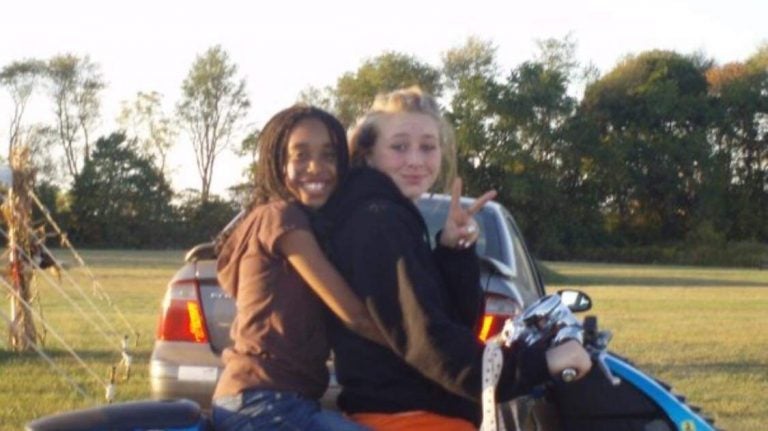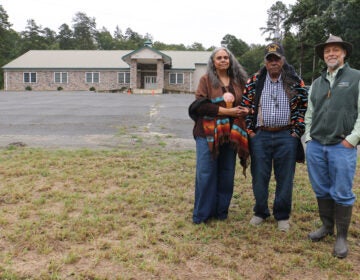Black in Flemington: Was the trauma worth it?
A former WHYY reporter reflects on her experience growing up as a black queer person in Flemington, New Jersey.

Taylor Allen (left) riding a quad at Black River Equestrian Farm in Hunterdon County, N.J., in 2006. (Courtesy of Taylor Allen)
“Where are you from?”
“Jersey.”
“Where?”
“You probably don’t know it. Kind of rural. Flemington.”
“There’s black people there?”
So goes the usual exchange when I talk about my small town in the Middle of Nowhere, New Jersey.
I graduated with 820 kids in my regional high school class. I don’t recall even 30 of them being black. My county, Hunterdon, 20 miles from Princeton, is 91% white.
I’m a queer black woman with a fro.
In Philadelphia, there’s nothing out of place about that. But back home, I’m a novelty at best and a freakshow at worst. But it doesn’t take much to know you’re considered different. I was reminded of that throughout my childhood.
At nine, I remember a friend’s parent declaring over dinner why interracial relationships were immoral. In his words, “Polar bears only stick with polar bears.”
I was first called the n-word in my fourth-grade class. It was actually pretty uneventful. The little boy who said the slur told me his father told him that black girls start smoking cigarettes young and get pregnant by 16. He didn’t say it harshly and I didn’t feel insulted, just thought he was weird.
“You’re just a nigger,” he said, as calmly as he’d state the multiplication problems we were doing in class.
I told my mom when I got off the bus that day and in typical black mama fashion, she marched down to my elementary school and demanded he was disciplined. He had to take a racial sensitivity training soon after. I’m not sure what that looked like for a fourth-grader.
When I was 11, my best friends, who were white, laughed at my natural fro the first time they saw my hair not straightened or braided.
At 14, as the only black kid in the honors history class, I felt the sneaked stares of every kid in the class during the lesson on slavery.
I remember going into my honors English class in 10th grade and a well-meaning teacher, whom I’m giving the benefit of the doubt, asked, “Excuse me, are you in the right class?”
At 16, I came out of the closet. A friend asked me if I thought she was pretty and wanted my input because I was “basically a guy.” Suddenly, I became more sexualized. Some girls didn’t want to have sleepovers with me anymore and some boys wanted me to prove my sexuality — asking me to kiss girls in front of them. It was gross.
My mom said I was too young to know my sexuality. Six years later, she has come around. My queer identity is not a secret, but it’s not something that is ever brought up in my family. It’s tense.
So, yes, growing up in Flemington was hard and, at times, extremely awkward.
The worst part about living through this was actively wondering to myself then and now, “Was it all in my head?” “Was my memory right?” “That person didn’t mean to insult me, did they?”
I didn’t completely feel validated until I called Hannah, an old classmate. Before writing this essay, I wanted to make sure it wasn’t all in my head.
I laughed as soon as she told me how she described our hometown: “The part of New Jersey that has more cows than people.”
Hannah’s white and she was also the first girl in my town that I knew of who came out as gay. We were in middle school at the time. I didn’t come out until my junior year of high school.
She, too, experienced a complicated relationship with back home.
“No one bullied me or anything [about being gay],” she said. “It was just experiencing the culture of homophobic jokes. I remember one time a guy was talking about how good the field hockey team was and another guy said, ‘It’s because they have a lezzy on the team.’ At the time, I laughed along because I didn’t feel like I could defend myself.”
Her story reminded me of the countless times I laughed along to black jokes and other casual racism that seemed to be the thread that wove together my town. That was the peculiar part of Flemington; it was ignorant, but ignorance was woven so tightly, you never see the seam. Nothing was overt.
But, here’s the thing. I have a soft spot for my town.
I am reluctant to say I love my town because it regularly told me that it doesn’t love me.
I have many fond memories of 4-H fairs, camping, bonfires, and a lot of horseback riding. I even rode a hot air balloon one time. And I loved listening to “Don’t Ya” by Brett Eldredge on repeat during prom weekend at the beach.
I grew up there. I ran alongside rivers with these wholesome, but racially tone-deaf, people. I ate lunch with them, hung out with their older siblings, and became a second daughter to my friends’ parents after spending all my time at their houses.
I have a distinct memory when I was 12 of canoeing down the Delaware River at camp with the sun baking my back, but water cooling my arms. When we were finished with our 15 miles for the day, a few of us went away from the campsite and found a cornfield. We imitated “Children of the Corn” and ended up throwing stalks at each other. It’s the most vivid memory I have of innocent summer fun.
I want to love my town so much, which is why I’m compelled to share what’s also not so great about it.
I want it to be so much more, a place that’s not just cornfields and Friday night high school football games, but a place that embraces inclusivity and acceptance.
Which is why I will call out my high school for not renewing the contract of our social studies teacher, a Palestinian-American and Muslim. I loved that one of our teachers would show students a video of Malala, a Pakistani activist for female education who, at 17, became the youngest person ever to win a Nobel Peace Prize.
It’s why I decry how often I heard racial slurs about Latinos in the hallway or share my annoyance with how peculiarly fixated people were with touching my hair. And as a teenager, did I really need to explain to adults that it was not OK, not OK at all, for the guy on Main Street to put up a “White History Month” sign, right after February?
It’s not ideal that I have to live with both adoration and trauma from my childhood.
I called another classmate, Hayley, who asked me not to use her real name since she still lives there. She’s straight, white, and bubbly. She’s what I would call an All-American girl. She’s also in college, away from home, and said she describes Flemington as “old-timey” and “probably never changed since it was first established.”
I asked her if she ever noticed racism in our town. Both Hayley and Hannah talked about how they heard hatred, particularly toward Latinos, in our community.
In Flemington, there is a small community of Latinos. A lot of them happened to live off our Main Street. I remember it derogatorily called “Little Mexico” regardless of whether the people there were actually Mexican.
I pressed them again if they noticed anything, particularly about black people.
Hayley said she remembered the black kids in school either hanging out with white kids or joining their own clique.
We talked about how there was one particular boy in our class who was extremely popular — he was in Model United Nations, preppy, and was a speaker at our graduation ceremony.
“He assimilated well,” she said.
At that moment, I knew she was right. I didn’t think about it until then, and I didn’t have the words to articulate how it all worked. Black children, including myself, who purposefully shied away from being a stereotypical black person fared pretty well in school. By faring pretty well, I mean not being ostracized.
I had to call Zuri, who also asked that her real name not be used. She doesn’t want to be associated with our town at all. She was one of the only black students in my school and a lesbian. We were neighbors and drove to school together our entire senior year. She admits that much of her time in Flemington was spent learning how to assimilate.
“It wasn’t my brightest time,” she said. “I happily jumped into trying to fit in. I pushed aside my sexuality and race identity background to blend in.”
Her older sister didn’t blend in as well and her group of friends was often described as “ghetto,” “ratchet,” and other racially loaded terms.
Zuri said she didn’t remember much about her time in Hunterdon County. She’d blocked it out. When people ask her where she’s from, she says Newark, where she lived before coming to Flemington in middle school.
Finally, I faced the call I dreaded the most: my mom. I love my mother. We have an incredibly close relationship, but I know she didn’t want to have this conversation any more than I did. She was there as I encountered all of my intersectional hiccups while growing up. She saw me struggle in school and crying when I came home off the bus. My hurt and anger were met with a familiar song and dance.
“I didn’t do anything wrong,” I’d cry.
“You did. You were born black,” she’d reply.
I know that comment wasn’t meant to be harsh. It was a reminder that being both black and a woman in America would always have its challenges. Whatever I was going through then would pale in comparison as I get older. I’m not sure if I actually agree with that yet. I’m still young with a lot of life to live…but I understood her.
We moved to Flemington because we couldn’t afford private school and the education system in the predominantly black and Latino town of Plainfield wasn’t up to my mother’s standards.
Her solution was to move. She consciously made the decision to displace me out of my element in the name of education. Every time I came home in tears, she decided my education would outweigh my trauma.
The call went exactly the way I thought it would — the song and dance I know by heart.
“Hey mom, you know Flemington is a little racist.”
“There’s racism everywhere.”
“I know, but it was hard being the only black kid in class for most of my life,” I tried to explain. “I felt like I couldn’t react when someone said something racist. When I did, mom, I was always punished and was seen as ‘the angry black woman.’ 2014 was a terrible year for me because Ferguson was in the news and all I heard was that he basically deserved to die because he wasn’t a perfect victim by white people’s standards.”
“Taylor Iman, would you rather have stayed in Plainfield where they had no AP classes? Where they had no college prep for you? They had gangs. You know what happened to Chris. I moved here for you.”
Chris is a neighborhood kid I grew up with and ran track with when we were in grade school. He was fast and people noticed. The story I’m told is that some gang members in town wanted to recruit him and when he said no, he kept getting jumped until finally, he agreed. Somewhere down the line, he got criminal records and fell into drug addiction. He’s been a cautionary tale my mom brings up every time I decide to voice my concerns.
“I know, Mom, I know…” I said, defeated.
Is she right? Maybe. I don’t think I would have found my love for journalism in Plainfield, where extracurriculars were being cut left and right because of the lack of money. What I do know is that it’s just not fair that my mother had to choose, like many black parents, between racism and education.
Can Hunterdon County change? A solid maybe said those I interviewed.
“Flemington is a simple place,” Hannah said. “Life is not complicated there.”
It has potential, she added, but that can only happen if people realize there’s a problem.
Do I think it can change? I’m not sure.
I don’t feel welcome there. I moved there when I was 9 years old and I’ve never felt like I belonged there. I felt like I had to mold myself every day I was there. The last four years in Philadelphia is the most comfortable I’ve ever been.
I don’t feel like I really started to live until I was 18. I don’t recognize myself before 2015. Who is she? I’m not certain. I just know she felt like a constantly displaced immigrant despite growing up there my entire life. Hunterdon County taught me a lot of lessons, but I have no desire to move back.
I know who I am now, and I love who I see.
WHYY is your source for fact-based, in-depth journalism and information. As a nonprofit organization, we rely on financial support from readers like you. Please give today.





